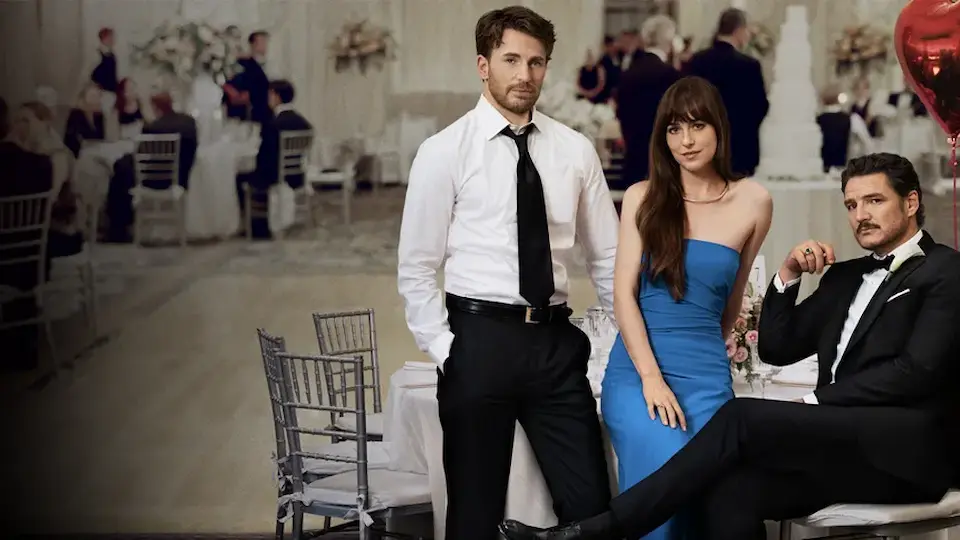“Materialists”: Love in the Times of Dating Apps
Directed by Celine Song, Materialists tries to offer commentary on modern dating tendencies and expectations.

If I had to point at the genre that has suffered more in this age of cinema decline, it has to be romance. No matter if it’s a drama or an innocuous romcom, modern cinema has a huge problem representing love on screen.
In a society where superficial things have become more important than ever, there seems to be no space for stories to depict real human connections without falling into clichés or making the project entirely about sex. Maybe it is simply that the new generation of writers has spent more time online, reading Wattpad-like books and joining dating apps, and truly has no idea what love is about.
Feminists will probably say otherwise, but the truth is that there is a huge interest in normal love stories. Just a man and a woman meeting and falling in love. That is why streaming services make bank producing cheap, low-quality dramas or romcoms, and people still watch them. As an audience, have we become more superficial? Yes. But also, there is nothing else out there.
More than a year ago, I wrote a review about Celine Song’s Past Lives, a drama that, while not being the classic romance, showed interest in portraying human connection. This year, Song came back with a new project that was marketed as a “romantic comedy” and counted on a more mainstream cast.
What is Materialists About?
Materialists focuses on Lucy (Dakota Johnson), a failed actress who works as a matchmaker for a company. In her line of work, she is confronted every day with the reality of the dating landscape, shaping her cynical perspective of relationships. In fact, she is only willing to get married herself if she finds a rich guy.
At one of her clients’ wedding party, she meets Harry (Pedro Pascal), a wealthy man that shows interest in her, and also reconnects with John (Chris Evans), her ex-boyfriend, who is working as a waiter at the event. The relationship came to an end because John was perpetually broke, but feelings are still there.
The encounter presents Lucy with two very different possibilities for her future and forces her to reconsider her priorities in life.
The Reality of Modern Dating
I have to admit that in some aspects, the film portrays the modern dating landscape quite well. The scenes where Lucy meets with her clients, which appear throughout the runtime, are a dynamic way to show how people think about dating in this day and age. Everybody believes they are a catch, has incredibly specific standards, and feels entitled to demand perfection from their potential partner without reflecting on what they are bringing to the table themselves. I also like that it touches on the impossible standards women have for men, because most movies usually just show one side of the argument.

Sadly, I believe this is all accurate. There is a huge divide between men and women that comes from different factors. Radical feminism is a part of it, but it’s also just the tip of the iceberg. The rise of social media and dating apps makes us constantly aware of how the rest of the world is doing, fomenting a constant comparison and dissatisfaction with our own lives. As they say, the grass is always greener on the other side of the fence. And that constant need to be seen has turned every aspect of life into something transactional. The topic has a number of things that could be analyzed and explored in a film, and the timing could not be better.
However, after watching Materialists in its entirety, my impression is that Celine Song does not have a clear idea of what she wants to communicate. Or she does, but she lost sight of it while writing the script.
Cash Beats Charm?
Materialists tries to play into the classic “poor suitor, rich suitor” trope, where a woman is pursued by two men with different economic situations. The rich one can offer stability and social status, while the poor one provides emotional connection and passion. The love triangle is usually solved by the woman choosing the poor guy to highlight the importance of feelings over material possessions. If it’s well used, I have no problem with this trope.
So in this case, Harry is a millionaire, has a mansion, and can afford to travel the world. In the words of Lucy herself, he is a “unicorn,” an anomaly of perfection. In contrast, John is poor. But the way the movie represents it just rubs me the wrong way.

John is an aspiring actor who has been trying to make it for over a decade. To survive, he works some shifts as a waiter while he auditions. He has to share a place with two roommates, and his apartment is chaotic and filthy. When I see things like this, I get the impression that the person behind the script grew up rich, and this is how they imagine “not having money” looks. I’m personally not going through a great time financially, and my apartment is far from luxurious, but I keep it spotless. Because there is a clear difference between being poor and being dirty and careless. I believe Song wanted to highlight the differences between the two men, but the end result is ridiculous and destroys the charm of the trope.
For the concept to work, the poor guy has to be someone hard-working, intelligent, promising, with good values and intentions, who, due to different circumstances, is going through a hard financial moment. He needs to have initiative, drive, and charisma. John is a bad choice, not because he is broke at the moment, but because he is a man without ambition or potential. The movie does not show him working hard to secure a better situation for himself or facing the tough times with dignity. He can’t even clean his own room!
He is also put in a position where he is Lucy’s lapdog, the one guy she comes back to every time, but with no intention to stay and compromise. So he is a pushover as well. Great, that is the man all women want.
The Protagonist’s Journey
As a protagonist, Lucy is bland and unlikable. The point in films like this is to start with the protagonist being superficial and cynical and watch her slowly grow and understand what matters the most.
Lucy doesn’t change at all. Her views on love remain the same, and her choosing John seems more of a temporary whim than character development. And that ruins the whole story, because if she has not changed, if she still believes that money is a huge issue for the relationship, why did she not end up with Harry instead? I don’t like Harry either, but it would make more sense for her.
So the ending becomes an enormous contradiction. Lucy thinks that marriage is a transaction and that money is key to having a life with someone, but she picks the poor guy because the director wanted her to.
Celine Song’s Work
Despite its execution, Materialists does not have the quality of a trashy Netflix movie. Celine Song is a good director, and the film shows it. I don’t think I agree with her idea of what a love story can be, but her skills are undeniable; her work has a distinctive visual style and pace.
However, the slow and contemplative vision that suited Past Lives so well and made it feel so intimate does not work for Materialists. Partly because Song messed up with the script, but also because a huge mistake was made with the casting choices. I would describe it as loud and overexposed people trying to make a quiet movie.

None of the actors offers a performance that inspires sympathy, and in this case, it’s not only the script’s fault. They are the same actors that are in everything, playing the characters they usually play. I don’t like Chris Evans particularly, I’m sick of Pedro, and I’m tired of giving Dakota the benefit of the doubt. Her performance is as flat as they come, and her voice puts me to sleep. Instead of making the project seem introspective, these actors create an awkward atmosphere, and as their characters are not very interesting by themselves, the film becomes boring.
Box Office
Materialists was released in the U.S. in June, but the project started reaching other countries (like mine) not too long ago. I’ve run into some reviews and opinions in the meantime, and the reception is mixed. It’s not the worst movie, but the contradictory message was not lost on the audience. Like me, a lot of people are sick of Pedro, and the fact that the project was marketed as a romcom (which it clearly is not) generated disappointment.
In terms of numbers, it was not a bad deal at all. Materialists cost $20.000.000, and so far have brought back over $60.000.000. Not a hit, but probably worth the investment.
My general perception of this film is that it was a great missed opportunity. The topic of modern relationships could be the source of many insightful stories. I hope someone has the clarity and talent to bring them to life soon.



